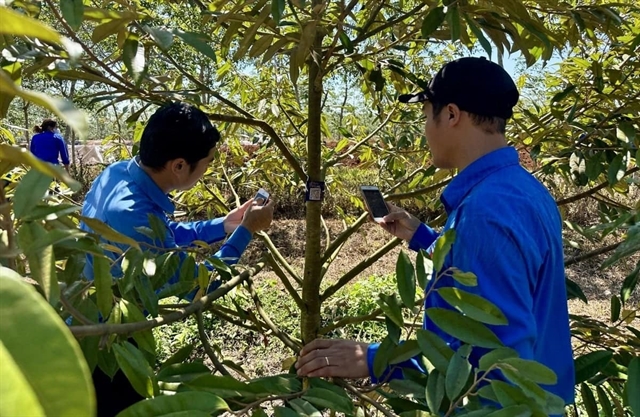 Economy
Economy

 |
| Dr. Nguyễn Đình Quân, an associate professor at HCM City University of Science and Technology and an R&D advisor for DeepPro, a tech startup in HCM City. — Photo courtesy of Nguyễn Đình Quân |
In today’s tech-driven world, the idea of being a “smart citizen” is crucial. Dr. Nguyễn Đình Quân, an associate professor at HCM City University of Science and Technology and R&D advisor at DeepPro, spoke with Nhà Đầu Tư (Investor) magazine about how everyone can become smart citizens in our digital future.
The public has heard about digital government, digital economy, and digital citizens, but they’re unsure how this will actually work in everyday life here in Việt Nam? Could you provide some insights?
Picture this: what if a citizen could do everything they need through just one app on their phone? They could register a business, pay their taxes, and even apply for subsidies—all in one place.
By digitising all the data related to our lives, we can allow computers to handle these tasks automatically and accurately. This would save people a tremendous amount of time on paperwork, notarisations, confirmations, and submitting applications. In turn, this means society as a whole would become more efficient and save resources.
Plus, digitisation can really boost business activities by encouraging investment and innovation.
Right now, my team and I are working on an exciting project called Deep Signature, which uses blockchain technology to create a “Smart Resident Card” for apartment complexes. Just imagine a resident who can move seamlessly through security checkpoints using a single unique code. They could access amenities and services in their community easily, securely, and at a low cost, like generating a QR code.
While these solutions might seem small, they are perfectly aligned with the vision of a digital government in the future.
Can you explain in simple terms how AI and blockchain will change our everyday lives?
Imagine blockchain as a secure, unchangeable public record, and think of AI as your smart assistant that helps you find and make sense of information from that record. For instance, when you go shopping and scan a product with DeepQR, blockchain ensures that the information you get is accurate. Meanwhile, AI can recommend related products based on what you’re looking for. We’re already used to interacting with AI such as ChatGPT in our daily routines, but blockchain can feel a bit more complex.
In our view, AI provides results that are more about trends and probabilities, analysing data to give you the best guess. On the other hand, blockchain offers a way to verify data with complete certainty. The fusion of AI and blockchain is definitely going to be a game-changer, enhancing efficiency and trust, and making operations smoother in many aspects of our lives.
For example, we’re working on an innovative concept called the Smart Green Supermarket. In these supermarkets, all the products will have clear information about their origins, thanks to DeepQR codes powered by blockchain technology.
Plus, the AI system will quickly suggest products that fit your shopping needs. The best part is that there won’t be any staff because everything will be fully automated, even the checkout process, which means you can expect lower prices.
What is the current status of the development of the model of a staffless supermarket?
We’re working on several digital technology projects using DeepSignature’s blockchain technology.
One of our standout initiatives is the Smart Green Supermarket designed to create a modern shopping experience for consumers. It allows shoppers to easily recognise products as they add them to their carts, trace the origin of items, generate orders, and make automatic payments – all through a simple QR code attached to each product. It’s a seamless way to transform the shopping experience!
Another project we’re developing is the Smart Resident Card. This combines DeepQR technology with scanning capabilities. It’s not just a key for entering and exiting apartment complexes; it also enhances security and acts as a convenient tool for managing living expenses. Residents can schedule the use of amenities and pay for services remotely, all in one place.
These initiatives are real-world applications of the concepts of ‘digital economy’ and ‘digital citizens’ that we at DeepPro are passionate about.
We aim to help people embrace a smart and modern lifestyle at an affordable cost compared to foreign technologies.
Currently, we’re over 90 per cent complete and getting ready for a pilot launch soon.
Startups in various fields are increasingly excited about incorporating AI and blockchain into their business practices. What advice do you have for them?
Absolutely! When we started advising DeepPro, we quickly focused on a B2B model, meaning we prioritised businesses right from the beginning. Business owners can sign up for a free trial of our anti-counterfeiting tool, DeepQR. This not only helps them build customer trust but also allows them to effectively manage their supply chain with a solution that promotes transparency about product origins.
We’ve noticed that many businesses want to leverage technology without making huge investments. That’s why we’ve developed a cost-effective technology system that doesn’t compromise on accuracy, security, or the ability to verify and prove authentic product origins. It’s all about making cutting-edge solutions accessible to everyone.
So, what do you think is the first step towards creating a vibrant digital citizen community in Việt Nam?
I believe it should start with small, manageable steps that can lead to significant changes. As researchers and tech enthusiasts, we’re working to support the management teams of apartment complexes by introducing Smart Resident Cards. This tool helps residents get comfortable with digital services in their everyday lives. Once they become familiar with these digital solutions, they’ll find it much easier to embrace online public services, like filing taxes or registering a business online. — VNS